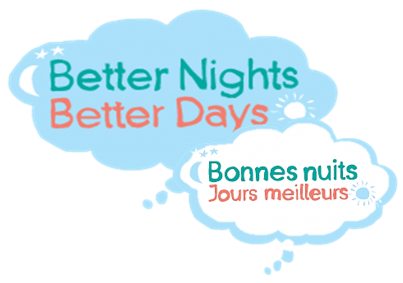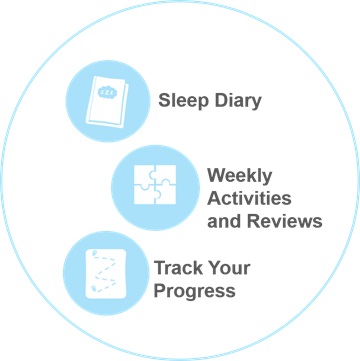 Better Nights, Better Days
Better Nights, Better Days
for Children with Neurodevelopmental Disorders
This program is specifically developed for children with Neurodevelopmental Disorders
 Better Nights, Better Days
Better Nights, Better Days for children with neurodevelopmental disorders has been specifically developed by a team of sleep experts and child health experts from across Canada. The program has specific streams for parents of children with a primary diagnosis of Attention Deficit Hyperactivity Disorder (ADHD), Autism Spectrum Disorder (ASD), Cerebral Palsy (CP), Fetal Alcohol Spectrum Disorder (FASD), as well as a general stream for children with NDDs other than ADHD, ASD, CP, or FASD.
for children with neurodevelopmental disorders has been specifically developed by a team of sleep experts and child health experts from across Canada. The program has specific streams for parents of children with a primary diagnosis of Attention Deficit Hyperactivity Disorder (ADHD), Autism Spectrum Disorder (ASD), Cerebral Palsy (CP), Fetal Alcohol Spectrum Disorder (FASD), as well as a general stream for children with NDDs other than ADHD, ASD, CP, or FASD.
Up to 25% of children suffer from sleep problems
Children may have trouble settling down at the end of the day, falling asleep, staying asleep, and waking too early. These issues are known as "insomnia”.
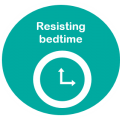
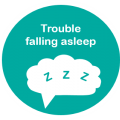
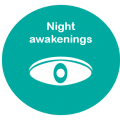
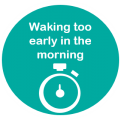
Children need to sleep well
When children get adequate sleep, their quality of life improves around the clock - better behaviour, better mood, and better school performance! A better night’s sleep can result in improved health and well-being for the entire family.
Few children receive treatment for sleep problems
Those who do may receive inappropriate treatment such as medication, which may have side effects. Very few children receive behavioural treatment options, which are proven to work. Parents may not have the time or resources to access these treatments, and many health care providers do not have the training to provide these treatments.
A team of psychologists, nurses and physicians - many of them parents themselves - developed the  Better Nights, Better Days
Better Nights, Better Days program and will be measuring its success
program and will be measuring its success
The program is based on behavioural principles - increasing and encouraging positive behaviours that will help children learn to settle down more quickly at bedtime and achieve a better quality of sleep throughout the night.
 Better Nights, Better Days
Better Nights, Better Days
may help provide a more accessible way of delivering health care
The Program
 Better Nights, Better Days
Better Nights, Better Days Program Sessions
Program Sessions
|
|
Session 1: Introduction Introduction to the program and information about how sleep works and how sleep problems develop. Information for parents about adult characteristics of sleep; how sleep problems develop in adults, and a link to download an adult Sleep Diary from the National Sleep Foundation.
|
|
|
Session 2: Healthy Sleep Practices Learn about healthy sleep practices and routines, and how doing things differently during the day and at night can help your child sleep better. Includes prompts for parents to consider the influence of factors on their own sleep, including their own sleep schedules, bedtime routines, sleep location, use of electronics before bed, exercise and diet, positivity, and sleep associations.
|
|
|
Session 3: Settling to Sleep Focus on problems settling to sleep independently at naptime and at bedtime. Includes evidence-based strategies recommended for adults on improving their ability to fall asleep.
|
|
|
Session 4: Going Back to Sleep Focus on using tools to help with night-wakings and what to do if your child wakes too early in the morning. Includes evidence-based strategies recommended for adults to manage to night wakings, napping, and early morning awakenings.
|
|
|
Session 5: Looking Back and Ahead Review your goals and progress you’ve made during the program, and develop a plan for the future. Includes descriptions of other sleep problems that adults may experience and guidance for when adults should contact their healthcare provider for assessment and treatment. |
 Better Nights, Better Days
Better Nights, Better Days Program Tools
Program Tools
|
Sleep Diary Fill out a daily online sleep diary to track your results and see patterns in your child’s sleep and behaviour as you complete the sessions. Weekly Activities and Reviews Complete activities that will help you make positive changes to improve your child’s sleep. For instance, learn how to create sleep routines, a healthy sleep environment, and practice techniques to reduce stress. Track Your Progress Throughout the program, you'll receive feedback on the positive changes that you're making to your child's sleep. |
|
